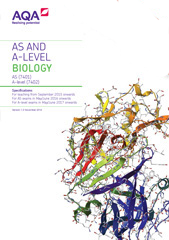AS practical assessment
Practical work is at the heart of biology, so we have placed it at the heart of this specification.
Assessment of practical skills in this AS specification will be by written exams only.
The practical endorsement does not apply to the AS specification. A rich diet of practical work is essential to develop students' manipulative skills and understanding of the processes of scientific investigation. It also contributes to teaching and learning of the concepts within this specification.
Questions in the papers have been written in the expectation that students have carried out at least the six required practical activities in section 7.2.
15% of the marks in the papers will relate to practical work.
Use of apparatus and techniques
All students taking this specification are expected to have carried out the required practical activities in section 7.2. These develop skills in the use of many of the following apparatus and techniques. This list is a compulsory element of the full A-level course. It is reproduced here for reference and to aid co-teaching the AS and A-level specifications.
Apparatus and techniques |
|
|---|---|
AT a |
use appropriate apparatus to record a range of quantitative measurements (to include mass, time, volume, temperature, length and pH) |
AT b |
use appropriate instrumentation to record quantitative measurements, such as a colorimeter or potometer |
AT c |
use laboratory glassware apparatus for a variety of experimental techniques to include serial dilutions |
AT d |
use of light microscope at high power and low power, including use of a graticule |
AT e |
produce scientific drawing from observation with annotations |
AT f |
use qualitative reagents to identify biological molecules |
AT g |
separate biological compounds using thin layer/paper chromatography or electrophoresis |
| AT h | safely and ethically use organisms to measure:
|
AT i |
use microbiological aseptic techniques, including the use of agar plates and broth |
AT j |
safely use instruments for dissection of an animal organ, or plant organ |
AT k |
use sampling techniques in fieldwork |
AT l |
use ICT such as computer modelling, or data logger to collect data, or use software to process data |
Required practical activities
The following practicals must be carried out by all students taking this course. Written papers will assess knowledge and understanding of these, and the skills exemplified within each practical.
Required activity |
Apparatus and technique reference |
|---|---|
1. Investigation into the effect of a named variable on the rate of an enzyme-controlled reaction |
a, b, c, f, l |
2. Preparation of stained squashes of cells from plant root tips; set-up and use of an optical microscope to identify the stages of mitosis in these stained squashes and calculation of a mitotic index |
d, e, f |
3. Production of a dilution series of a solute to produce a calibration curve with which to identify the water potential of plant tissue |
c, h, j, l |
4. Investigation into the effect of a named variable on the permeability of cell-surface membranes |
a, b, c, j, l |
5. Dissection of animal or plant gas exchange system or mass transport system or of organ within such a system |
e, h, j |
6. Use of aseptic techniques to investigate the effect of antimicrobial substances on microbial growth |
c, i |
Teachers are encouraged to vary their approach to these practical activities. Some are more suitable for highly structured approaches that develop key techniques. Others allow opportunities for students to develop investigative approaches.
This list is not designed to limit the practical activities carried out by students. A rich practical experience for students will include more than the six required practical activities. The explicit teaching of practical skills will build students’ competence. Many teachers will also use practical approaches to the introduction of content knowledge in the course of their normal teaching.
Practical skills to be assessed in written papers
Overall, at least 15% of the marks for an AS Biology qualification will require the assessment of practical skills.
In order to be able to answer these questions, students need to have been taught, and to have acquired competence in, the appropriate areas of practical skills as indicated in the table of coverage below.
Independent thinking
Practical skill |
|
|---|---|
PS 1.1 |
Solve problems set in practical contexts |
PS 1.2 |
Apply scientific knowledge to practical contexts |
Use and application of scientific methods and practices
Practical skill |
|
|---|---|
PS 2.1 |
Comment on experimental design and evaluate scientific methods |
PS 2.2 |
Present data in appropriate ways |
PS 2.3 |
Evaluate results and draw conclusions with reference to measurement uncertainties and errors |
PS 2.4 |
Identify variables including those that must be controlled |
Numeracy and the application of mathematical concepts in a practical context
Practical skill |
|
|---|---|
PS 3.1 |
Plot and interpret graphs |
PS 3.2 |
Process and analyse data using appropriate mathematical skills as exemplified in the mathematical appendix for each science |
PS 3.3 |
Consider margins of error, accuracy and precision of data |
Instruments and equipment
Practical skill |
|
|---|---|
PS 4.1 |
Know and understand how to use a wide range of experimental and practical instruments, equipment and techniques appropriate to the knowledge and understanding included in the specification |
